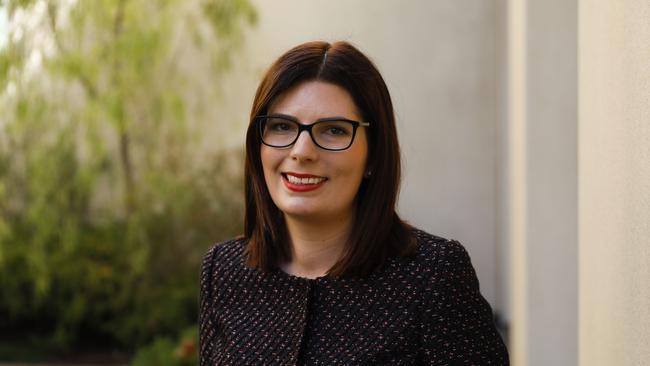Adelaide women share with a federal inquiry how menopause and perimenopause crippled their lives and work
It leaves one in five women debilitated in mid-age — but remains bafflingly misunderstood by doctors and workplaces. These women are fighting for that to change.

SA News
Don't miss out on the headlines from SA News. Followed categories will be added to My News.
When Adelaide nurse Jodie was promoted into a senior role, it should have been an exciting milestone in the prime of her career.
Instead, she began experiencing severe brain fog and a loss of confidence – as a result, she was so badly bullied in her workplace that she ended up resigning.
Jodie, 52, is one of about 20 per cent of women who experience severe menopause symptoms, and one of three Adelaide women who shared their experiences with a federal inquiry that hopes to shed light on the crippling lack of knowledge in the area.
“It’s not discussed, and it’s not talked about as a part of your work or part of what you’re going through,” Jodie said.
“Not only is it not supported, in my experience, it’s actually not tolerated.”

Jodie said she had seen about 10 other female colleagues in their 50s before her choose to leave her organisation due to symptoms associated with menopause – which can include mental health issues, joint and muscle pain and debilitating sleep problems.
According to the Association of Superannuation Funds of Australia, one in seven Australian women pay a price for menopause through lower superannuation savings due to temporarily or prematurely leaving the workforce because of their symptoms.
At one stage, the 52-year-old experienced anxiety so severe she was unable to leave the house without one of her kids with her.
“My director above me even verbalised that they had noticed my lack of confidence but I wasn’t given support – in fact, it was the opposite … I was bullied until I left,” she said.
“I was seeing our nursing staff really starting to struggle in the prime of their career with things like shift work and the physical aspects of work and suddenly not being able to do that, reducing hours and leaving the workforce.”
In 2016, Charlene started her dream job as a travel agent. But shortly after she began, she started suffering crippling migraines that impacted her ability to walk. Because of her symptoms, Charlene was forced to resign.
“There were days when … all I wanted to do was crawl into a corner and cry. It is something that most people just don’t understand,” she said.
“I felt like I was going crazy and there was nobody to talk to about how I was feeling.
“Some of my old co-workers knew I was suffering but it was almost like it was a taboo subject … I experienced absolutely no workplace support.”
The parliamentary inquiry is probing the often still-taboo impacts on women’s physical and mental health, economic circumstances, how the health industry manages treatments and symptoms and the overall stigma associated with perimenopause and menopause.
About 160,000 women enter menopause each year, but many doctors remain drastically uninformed when it comes to the issue or its treatment options.
Just after her 40th birthday, Laura began experiencing paralysing vertigo, muscle and joint pain, memory lapses, rare infections and heart palpitations.

She also experienced increasing anxiety and low moods.
Living in regional SA, she visited her local GP in a bid for answers – but was told she should just “try and relax more, as it must be anxiety or too much caffeine”.
It was only when she turned to social media and found Facebook pages where women shared their menopause experiences that she realised it could be the cause of her health issues.
But when she turned to another GP, she was once again let down.
“I remember feeling like my body was falling apart,” she said.
“As a new 40 year old woman, I’d never heard of the term perimenopause.”
“I was told that I didn’t meet the criteria for treatment and that she couldn’t help me because I was too young, and because my cycles were still regular I should just go on the pill.”
Eventually, Laura found a specialist who put her on “life changing” Menopausal Hormone Therapy (MHT) — but said women should not be forced to fight for access to care.
“I wish it hadn’t taken three years for me to be able to feel like myself again,” she said.
“This is not a specialist topic, this is something that we should be able to go to our GP about.”
Deputy chair SA Senator Marielle Smith said “overwhelmingly” the inquiry had heard women felt they were not adequately being heard by health practitioners and were being dismissed within their workplaces when they raised issues.
“We need to make sure that women are getting good quality care from their clinicians, so they feel well supported if they have got these negative symptoms which are impacting their lives,” Ms Smith said.
“Women in midlife are at the peak of their careers, so we need to make sure that women are supported to stay in the workforce.”
Greens Senator Larissa Waters said shedding light on the issue and removing stigma, as well as policy change, would be key to helping women through their symptoms.
“We need to make sure that people do feel safe and supported to have those conversations … we want to be believed and supported and have just a little bit of flexibility,” she said.
The inquiry is expected to report its findings this September.
More Coverage
Originally published as Adelaide women share with a federal inquiry how menopause and perimenopause crippled their lives and work





